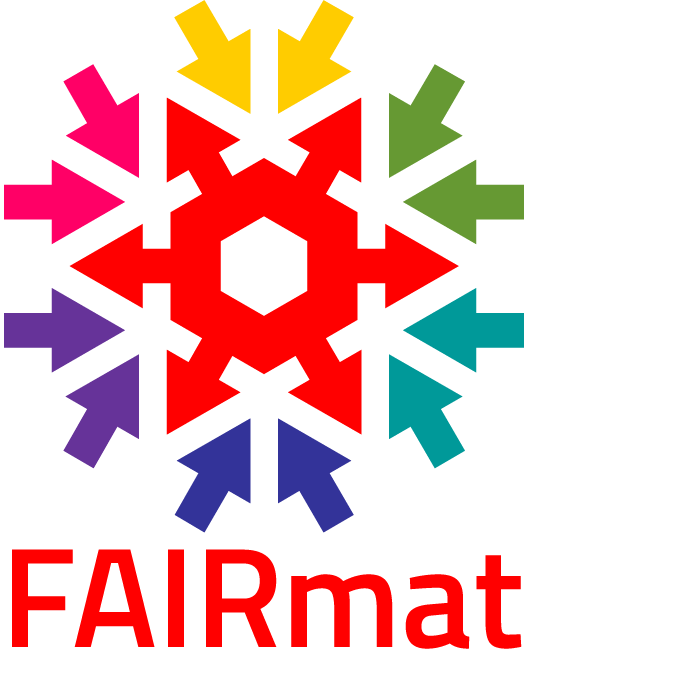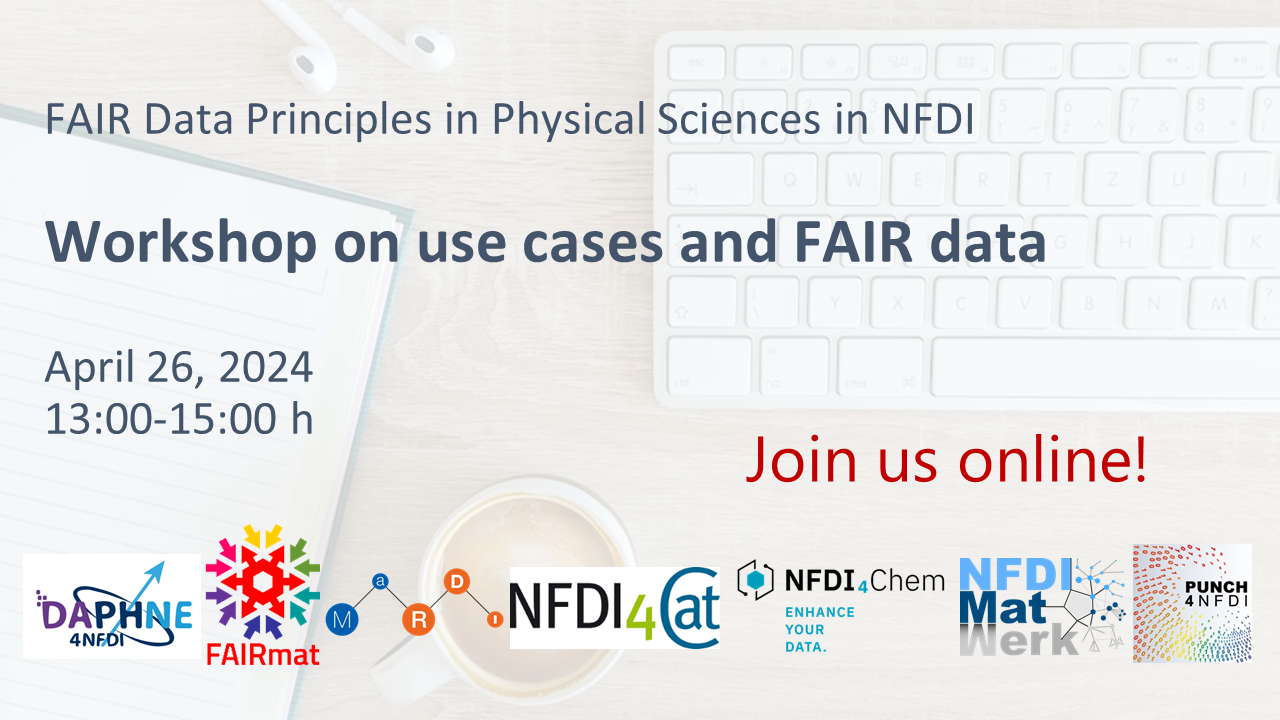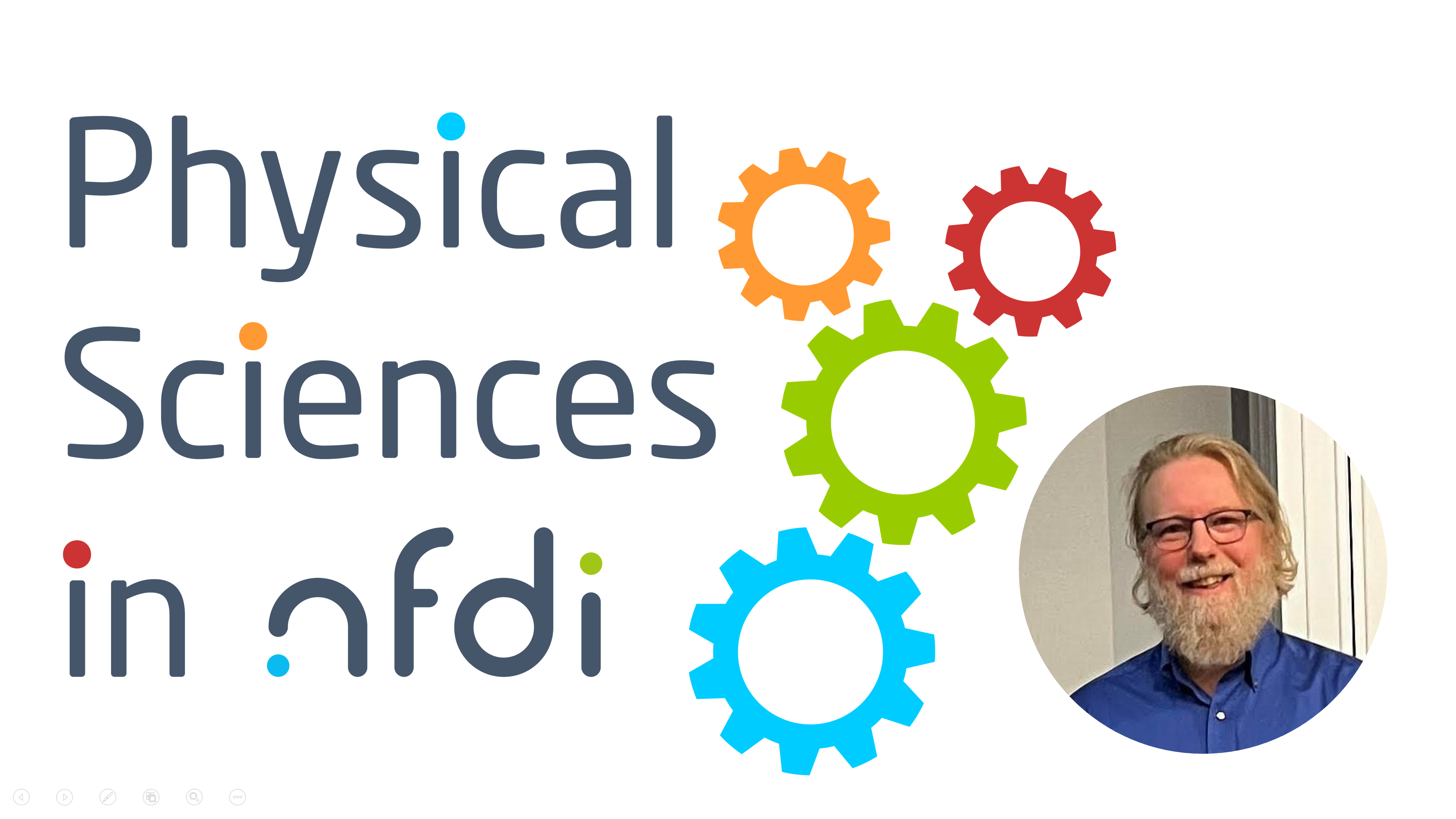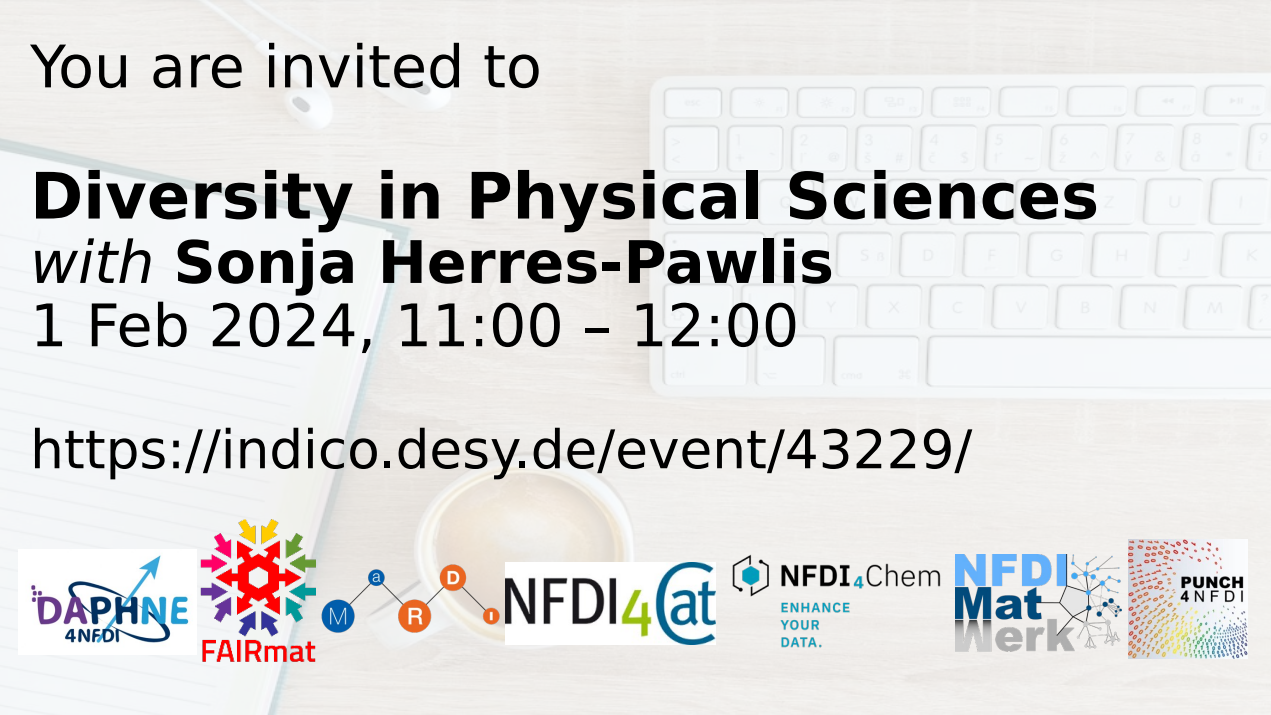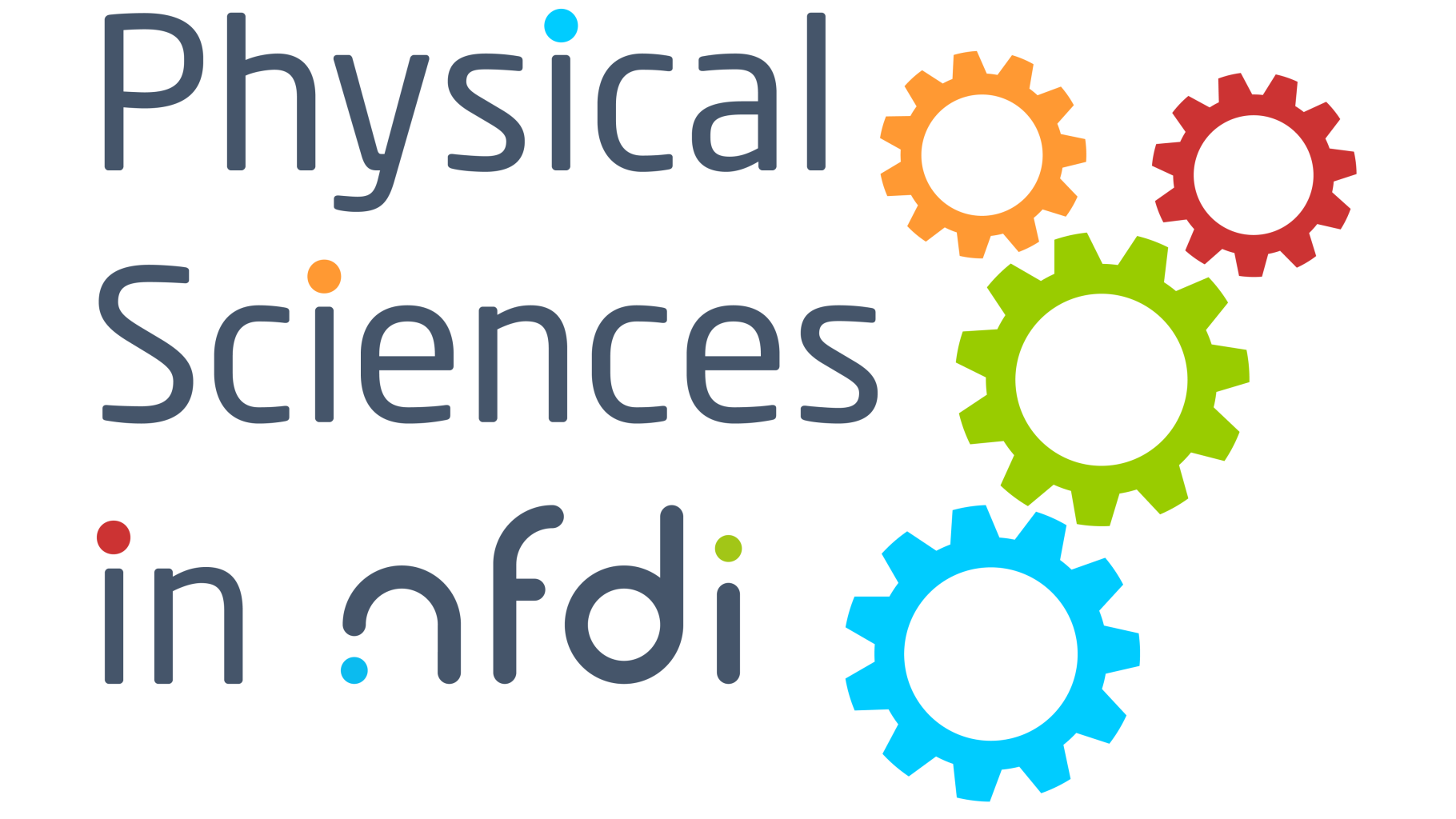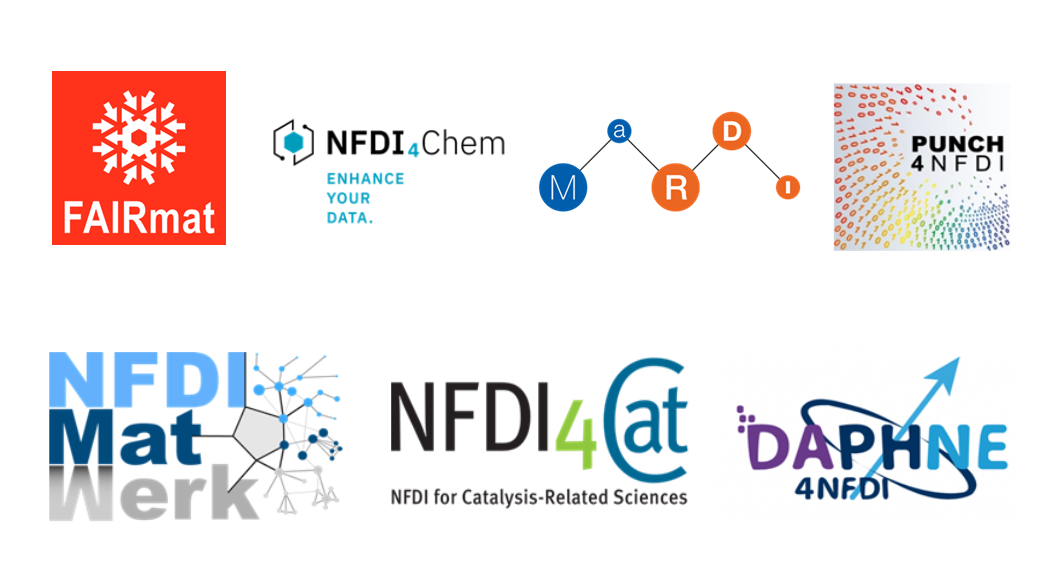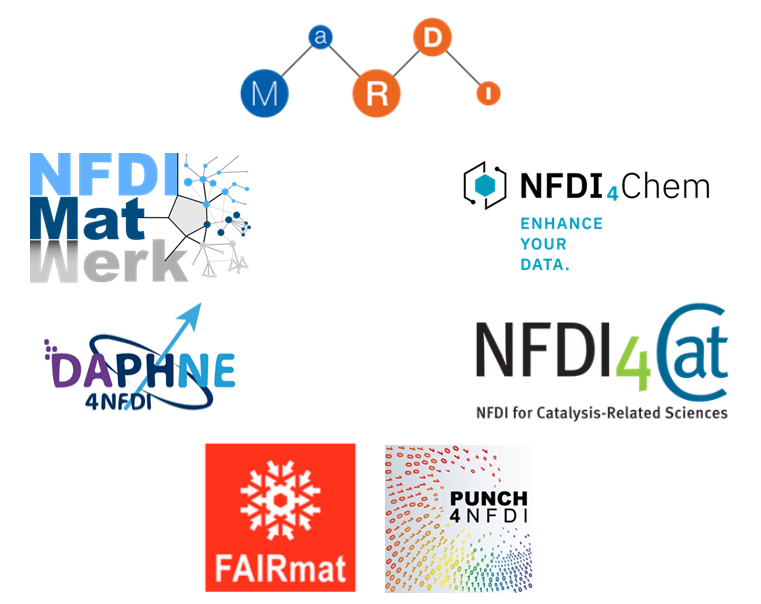About us
Physical Sciences in NFDI is a collaboration between the NFDI consortia DAPHNE4NFDI, FAIRmat, MaRDI, NFDIMatWerk, NFDI4Catt, NFDI4Chem and PUNCH4NFDI. We unite experts on a broad spectrum of topics in physics, chemistry, mathematics and informatics. In our talk series we invite leading scientists to showcase good data practices to an international, interdisciplinary audience.
You can view the group's official webpage here.
Our goal is to foster collaborations between our consortia. If you would like to learn more about us or suggest a future event or project, please contact Area F for more information.

Our events
This time, Astrid Schneidewind (FZ Juelich, DAPHNE4NFDI) will talk about her academic career before we invite you to a discussion on individual and remarkable CVs.
Further information will soon be available on the Indico page: https://indico.desy.de/event/45519/
We are happy to announce our next workshop on use cases in the NFDI, presented by Physical Sciences in NFDI (PSinNFDI).
While different disciplines experience different challenges in establishing the FAIR principles for research data, there are also many similar approaches and solutions. In this workshop, we will present examples of use cases highlighting those common concepts, tools, and software that exploit workflows to achieve FAIR data across scientific disciplines. FAIR data does not start in a repository, but needs to be established already during the data generation within a research process. Hence, we invite you to join us in exploring tools and approaches to create FAIR workflows with fascinating use cases from:
- PUNCH4NFDI: Curating Data Flows: Leveraging REANA for Reproducible Analyses of Dimensionality Reduction Workflows
- NFDI-MatWerk: Creating and running automated workflows for material science simulations
- DAPHNE4NFDI: Overarching Data Management Ecosystem HELIPORT
Join us online: https://us02web.zoom.us/j/83305688762
X-ray Absorption Spectroscopy (XAS) gives unique information about the chemical state of materials. Highquality XAS data requires well-prepared samples and access to valuable synchrotron beamlines or state-ofthe-art laboratory sources, XAS data is a rare and valuable commodity. Well-maintained databases of XAS spectra on both standard reference materials and samples then become important for the synchrotron and scientific communities, both for individual researchers and for automated machine-learning methods. Enabling the automated use of spectral libraries requires curated and documented formats and metadata fields for the spectral data. I will present existing XAS spectral libraries and formats, and report on progress from a Working Group from the XAFS community towards standardizing metadata and defining specifications for both plain text and NeXuS/HDF5 formats for XAS data.
How can diversity and equality be increased in the physical sciences? Is it even still necessary or have we already achieved equality, for example with respect to gender? Which measures were taken within the individual scientific communities and what were the outcomes? And which situation do we encounter in infrastructure projects such as the various NFDI consortia?
Sonja Herres-Pawlis (NFDI4Chem) will share her experiences on the situation of diversity within chemistry in a keynote talk.
Afterwards, we invite you to join the discussion on these and more questions related to diversity, equality and equity in order to exchange experiences and discuss new ideas.
Click here to access the meeting!
Different disciplines face different specific challenges, but there are also many similarities. With a focus on software tools and their application, we want to explore use cases within the different consortia and find advantages and challenges in achieving the FAIR principles across disciplines.
The following use cases will be included in the workshop:
- Introduction to the FAIR principles - Michael Liebau, NFDI4Cat
- Interactive Exploration of the Perovskite Solar Cell Research Landscape with the NOMAD's Solar Cell App - José Márquez, FAIRmat
- Electronic Lab Notebooks: Chemotion - Benjamin Golub, NFDI4Chem
- NOMAD CAMELS - Alexander Fuchs / Michael Krieger, FAIRmat
You are invited to join us for the Physical Sciences in NFDI colloquium on June 15, 2023 at 11:00, in Berlin and online. Taylor D. Sparks (University of Utah) will give the talk Materials informatics: Moving beyond screening via generative machine learning models.
Dr. Egon Willighagen, Department of Bioinformatics, NUTRIM School of Nutrition and Translational Research in Metabolism Faculty of Health, Medicine and Life Sciences, Maastricht University: Open and FAIR knowledge and data dissemination. This talk is part of the NFDI Physical Sciences Joint Colloquium.
Ian Bird, Technical Coordinator in ESCAPE and Project Lead of the Worldwide LHC Computing Grid (2008 - 2020) will speak about Exascale-era data challenges in Physics & Astronomyin the NFDI Physical Sciences Joint Colloquium.
Susanna-Assunta Sansone, Academic Lead of Research Practice; Professor of Data Readiness, Dep of Engineering Science; Associate Director, Oxford e-Research Centre will give the talkFAIR data: no longer optional, but it takes a village! in the NFDI Physical Sciences Joint Colloquium.
John R. Helliwell, Emeritus Professor of Chemistry (University of Manchester), Chairman of IUCr and IUCr and Representative to CODATA will give the talk Applying the FAIR Principles to Crystallography Data Publication – a use case for DAPHNE4NFDI? in the NFDI Physical Sciences Joint Colloquium.
Nancy Washton, Catalysis Science Group Lead, Physical Sciences Division, Pacific Northwest National Laboratory will give the talk Strategy for and psychosocial aspects of realizing FAIR data processes in the NFDI Physical Sciences Joint Colloquium.
Chris Wolverton, Northwestern University will give the talk The Phase Diagram of All Inorganic Materials in the NFDI Physical Sciences Joint Colloquium.
For the first talk in the NFDI Physical Sciences Joint Colloquium James A. Warren, Director of the NIST Materials Genome Program will speak about The Next Decade of the US Materials Genome Initiative
